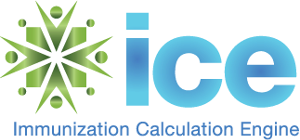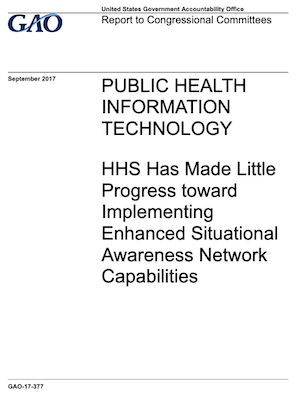 PatientPoint®, the trusted leader of patient and physician engagement solutions across all points of care, today announced a collaboration with national addiction prevention, treatment and recovery nonprofit Shatterproof to place opioid education in nearly 25,000 physician offices across the country. This program, the first national point-of-care initiative of its kind, will reach an estimated 15 million patients and caregivers each month and up to 200 million annually.
PatientPoint®, the trusted leader of patient and physician engagement solutions across all points of care, today announced a collaboration with national addiction prevention, treatment and recovery nonprofit Shatterproof to place opioid education in nearly 25,000 physician offices across the country. This program, the first national point-of-care initiative of its kind, will reach an estimated 15 million patients and caregivers each month and up to 200 million annually.
Centers for Disease Control and Prevention (CDC)
See the following -
NIH-built Toolset Helps Researchers Share and Compare Data
On battlefields across the Middle East and football fields in the United States, traumatic brain injury (TBI) has hit near-epidemic proportions in the past several years. Officials at the Centers for Disease Control and Prevention say it leads to 52,000 deaths and 275,000 hospitalizations in the U.S. each year. The spiraling caseload is pushing biomedical researchers to stretch their increasingly tight budgets and maximize their research to help prevent TBI and other serious health threats. Read More »
- Login to post comments
No One Knows How Many Patients Are Dying from Superbug Infections in California Hospitals
Many thousands of Californians are dying every year from infections they caught while in hospitals. But you’d never know that from their death certificates. Sharley McMullen of Manhattan Beach came down with a fever just hours after being wheeled out of a Torrance Memorial Medical Center operating room on May 4, 2014. A missionary’s daughter who worked as a secretary at Cape Canaveral, Fla., at the height of the space race, McMullen, 72, was there for treatment of a bleeding stomach ulcer. Soon, though, she was fighting for her life...
- Login to post comments
Nurses' Scrubs Often Contaminated with Bad Bugs
 Bad bugs readily spread from patients in the intensive care unit (ICU) to nurses' scrubs and the room, according to research being presented at IDWeek 2016™. The sleeves and pockets of the scrubs and the bed railing were the most likely to be contaminated. The study tracked the transmission of bacteria known to be particularly troublesome in hospitals, including those such as methicillin-resistant Staphylococcus aureus (MRSA), Klebsiella pneumoniae and Pseudomonas aeruginosa, which are resistant to many antibiotics...
Bad bugs readily spread from patients in the intensive care unit (ICU) to nurses' scrubs and the room, according to research being presented at IDWeek 2016™. The sleeves and pockets of the scrubs and the bed railing were the most likely to be contaminated. The study tracked the transmission of bacteria known to be particularly troublesome in hospitals, including those such as methicillin-resistant Staphylococcus aureus (MRSA), Klebsiella pneumoniae and Pseudomonas aeruginosa, which are resistant to many antibiotics...
- Login to post comments
Oakland Biohackers Beat Funding Goal for Open Source Insulin Protocol
 From day jobs at such powerhouse facilities as UC San Francisco, Amgen Inc., and Lawrence Livermore National Laboratories, they come to work on the project called Open Insulin. The project aims to accelerate development of a generic version of the lifesaving medicine while showing that citizen scientists and biohackers can contribute an alternative to methods now used by the for-profit pharmaceutical business model, says the group’s 33-year-old co-founder Anthony Di Franco of Berkeley...
From day jobs at such powerhouse facilities as UC San Francisco, Amgen Inc., and Lawrence Livermore National Laboratories, they come to work on the project called Open Insulin. The project aims to accelerate development of a generic version of the lifesaving medicine while showing that citizen scientists and biohackers can contribute an alternative to methods now used by the for-profit pharmaceutical business model, says the group’s 33-year-old co-founder Anthony Di Franco of Berkeley...
- Login to post comments
Obama Finally Gets Serious On Ebola
To use a current California comparison, the Ebola outbreak in West Africa is like a runaway wildfire: quick-moving, all-consuming and deadly. Until now, outside nations, including this country, have brought barely a garden hose to the fight...
- Login to post comments
ONC Selects Noam Arzt to serve on the ONC Trusted Exchange Framework Task Force
 The Office of the National Coordinator for Health Information Technology (ONC) has selected Dr. Noam H. Arzt, President of HLN Consulting (HLN), as a member of the Trusted Exchange Framework Task Force. This group of healthcare and health information technology specialists will advise ONC on various aspects of the Draft Trusted Exchange Framework. This framework outlines a common set of principles for trusted exchange of health information records and minimum terms and conditions for trusted exchange as directed by Congress in the 21st Century Cures Act.
The Office of the National Coordinator for Health Information Technology (ONC) has selected Dr. Noam H. Arzt, President of HLN Consulting (HLN), as a member of the Trusted Exchange Framework Task Force. This group of healthcare and health information technology specialists will advise ONC on various aspects of the Draft Trusted Exchange Framework. This framework outlines a common set of principles for trusted exchange of health information records and minimum terms and conditions for trusted exchange as directed by Congress in the 21st Century Cures Act.
- Login to post comments
ONC's 3rd Interoperability Forum: Not Much to Report
 On August 21 and 22, 2019 the Office of the National Coordinator for Health Information Technology (ONC) held its third Interoperability Forum in Washington, DC. More than 600 individuals participated in person with many others viewing the general sessions via webinar. The conference began and ended with half-day plenary sessions while providing five tracks with smaller sessions in between. I attended the Health Information Exchange (HIE)/Community-based Information Exchange (CIE) breakout session on both days. The plenaries...focused on the current state and the future state of interoperability.
On August 21 and 22, 2019 the Office of the National Coordinator for Health Information Technology (ONC) held its third Interoperability Forum in Washington, DC. More than 600 individuals participated in person with many others viewing the general sessions via webinar. The conference began and ended with half-day plenary sessions while providing five tracks with smaller sessions in between. I attended the Health Information Exchange (HIE)/Community-based Information Exchange (CIE) breakout session on both days. The plenaries...focused on the current state and the future state of interoperability.
Open Source Immunization Forecaster Updated to Support Pfizer COVID Vaccine
 On December 15, 2020, HLN released a new version (v1.26.2) of the Immunization Calculation Engine (ICE) in support of the Pfizer COVID vaccine. ICE is a state-of-the-art open source software system that provides clinical decision support for immunizations for use in Immunization Information Systems (IIS), Electronic Health Record (EHR), and Personal Health Record (PHR) Systems. Version 1.26.2 includes support for new COVID-19 Vaccine Group (with the Pfizer vaccine only). A subsequent release, coming soon, will likely add support for the Moderna vaccine. Read More »
On December 15, 2020, HLN released a new version (v1.26.2) of the Immunization Calculation Engine (ICE) in support of the Pfizer COVID vaccine. ICE is a state-of-the-art open source software system that provides clinical decision support for immunizations for use in Immunization Information Systems (IIS), Electronic Health Record (EHR), and Personal Health Record (PHR) Systems. Version 1.26.2 includes support for new COVID-19 Vaccine Group (with the Pfizer vaccine only). A subsequent release, coming soon, will likely add support for the Moderna vaccine. Read More »
- Login to post comments
Open Source Machine Learning Tools are as Good as Humans' in Cancer Surveillance According to Regenstrief, Indiana Univ. Study
 Machine learning has come of age in public health reporting according to researchers from the Regenstrief Institute and Indiana University School of Informatics and Computing at Indiana University-Purdue University Indianapolis. They have found that existing algorithms and open source machine learning tools were as good as, or better than, human reviewers in detecting cancer cases using data from free-text pathology reports. The computerized approach was also faster and less resource intensive in comparison to human counterparts.
Machine learning has come of age in public health reporting according to researchers from the Regenstrief Institute and Indiana University School of Informatics and Computing at Indiana University-Purdue University Indianapolis. They have found that existing algorithms and open source machine learning tools were as good as, or better than, human reviewers in detecting cancer cases using data from free-text pathology reports. The computerized approach was also faster and less resource intensive in comparison to human counterparts.
- Login to post comments
Open Source Software Is Transforming Healthcare
 In the summer of 2022, the UK government and NHS England published its Open Source Policy, stating that open source technology is: Particularly suitable for use within the healthcare industry where, through active collaboration between IT suppliers and user/clinicians communities, solutions can be honed to maximise benefits to delivery of health and social care. The public statement by NHS England is just the latest development in a broader trend: The wholehearted embrace of open source software by the healthcare sector. And no wonder; open source presents myriad opportunities for this most complex of industries, with potential solutions across various sub-sectors. Yes, open source is now powering everything from medical wearables to healthcare human resource management.
In the summer of 2022, the UK government and NHS England published its Open Source Policy, stating that open source technology is: Particularly suitable for use within the healthcare industry where, through active collaboration between IT suppliers and user/clinicians communities, solutions can be honed to maximise benefits to delivery of health and social care. The public statement by NHS England is just the latest development in a broader trend: The wholehearted embrace of open source software by the healthcare sector. And no wonder; open source presents myriad opportunities for this most complex of industries, with potential solutions across various sub-sectors. Yes, open source is now powering everything from medical wearables to healthcare human resource management.
- Login to post comments
Open Source Solutions For Public Health Case Reporting and COVID-19
 The United States is continuing its slow emergence from a nation-wide shut down imposed to slow down the spread of COVID-19. Most states have started to reopen, with bars, restaurants, and many workplaces starting to fill. As people begin to spend more time together again, it is critically important that public health agencies do everything they can to help prevent further spread of the infection and continue to monitor the level of infection within the population. Data is an important tool that public health has to understand what is going on in the country. Years of limited government investment and neglect of current systems has limited public health's ability to meet the challenges of managing both localized outbreaks and pandemics.
The United States is continuing its slow emergence from a nation-wide shut down imposed to slow down the spread of COVID-19. Most states have started to reopen, with bars, restaurants, and many workplaces starting to fill. As people begin to spend more time together again, it is critically important that public health agencies do everything they can to help prevent further spread of the infection and continue to monitor the level of infection within the population. Data is an important tool that public health has to understand what is going on in the country. Years of limited government investment and neglect of current systems has limited public health's ability to meet the challenges of managing both localized outbreaks and pandemics.
- Login to post comments
Overdue Outbreak Detection System Leaves Patchwork Defense
 The U.S. should have had a nationwide network to monitor for the next viral outbreak or biological threat a decade ago. It still doesn't. Instead, public health leaders make do with a patchwork system while waiting for the Department of Health and Human Services races to get its integrated network in service by a new 2023 congressional deadline. Until that nationwide monitoring system is in place, the U.S. runs the risk that a biological threat like a disease outbreak will take hold before it's noticed. "The risk is that we don't have the level of surveillance that we need. The risk is that there are things basically flying under the radar," said Helen Boucher, an infectious diseases clinician at Tufts Medical Center in Boston and director of the university's Center for Integrated Management of Antimicrobial Resistance.
The U.S. should have had a nationwide network to monitor for the next viral outbreak or biological threat a decade ago. It still doesn't. Instead, public health leaders make do with a patchwork system while waiting for the Department of Health and Human Services races to get its integrated network in service by a new 2023 congressional deadline. Until that nationwide monitoring system is in place, the U.S. runs the risk that a biological threat like a disease outbreak will take hold before it's noticed. "The risk is that we don't have the level of surveillance that we need. The risk is that there are things basically flying under the radar," said Helen Boucher, an infectious diseases clinician at Tufts Medical Center in Boston and director of the university's Center for Integrated Management of Antimicrobial Resistance.
- Login to post comments
PatientPoint and Shatterproof Launch National Point-of-Care Education Initiative to Fight Opioid Epidemic
- Login to post comments
Public Health Information Systems Are Not Just About Technology
 Public health information systems have always been a key component of the healthcare ecosystem. Links between clinical care and public health have only been increasing, propelled by the pandemic. As defined by the Public Health Informatics Institute (PHII) in its 2021 Immunization Information System (IIS) Core Competency Model, information systems management is the “application and administration of technologies to securely and effectively meet IIS program and user needs”. The pandemic highlighted the need for public health information systems to collect, track, and monitor vaccine administration for ages newborn through adulthood, and mandated data to be reported or accessible to a broad range of recipients at the local, state and federal level.
Public health information systems have always been a key component of the healthcare ecosystem. Links between clinical care and public health have only been increasing, propelled by the pandemic. As defined by the Public Health Informatics Institute (PHII) in its 2021 Immunization Information System (IIS) Core Competency Model, information systems management is the “application and administration of technologies to securely and effectively meet IIS program and user needs”. The pandemic highlighted the need for public health information systems to collect, track, and monitor vaccine administration for ages newborn through adulthood, and mandated data to be reported or accessible to a broad range of recipients at the local, state and federal level.
- Login to post comments
Public Health Tech: The Future of Health Tech You Never Heard Of
Digital Health has experienced a glorious boom in the last decade and is expected to reach $379.3 Billion by 2024 with 25% of the growth occurring between 2016 and 2024. Patient management can now be done on user-friendly platforms; physicians can remotely monitor their patients with mobile devices and telemedicine; and personal trackers and genetic testing are allowing patients easier access to their own health data. Clearly, we understand the kind of power technology has on improving the delivery of care and management of disease...
- Login to post comments